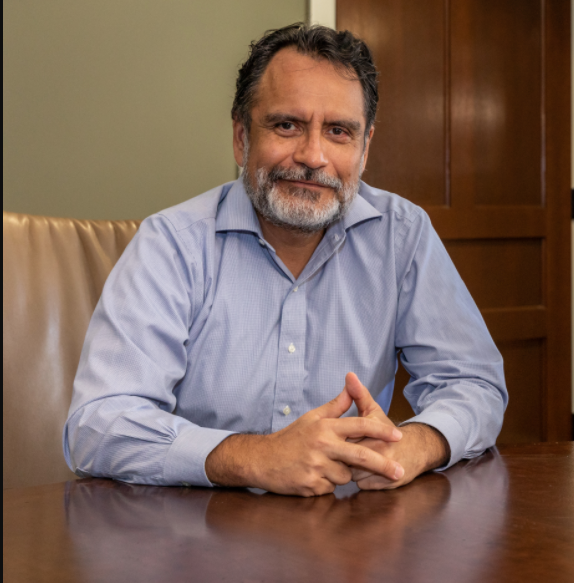Rogelio Garcia Contreras
 Teaching Assistant Professor, Director of Social Innovation
Teaching Assistant Professor, Director of Social Innovation
Ph.D., Josef Korbel School fo International Studies, University of Denver
M.A., University of Denver, Internaional Studies
B.S., Purdue University, Mathematics
rogeliog@uark.edu
In his own words ...
When I was growing up, I wanted to be…an architect! I've always been interested in how space can bring light and emotions to your day. I also always though I would work for my dad's business. He was a chicken producer, and I thought it would be neat to work with him.
My favorite place to travel…Everywhere, but especially to places where the language is not the same, and the circumstances are a bit more difficult. I really like to travel a lot, and I learn a lot from places where people have to get by without a lot of infastructure and wealth.
My favorite thing about working with honors students is…they are very diligent about doing their work. They come prepared, they ask good questions, they ALWAYS make me think.
One thing you can always find in my fridge…Oat milk! I'm lactose intolerant but I like smoothies and cereal, so it's a staple in my fridge.
About his research:
Rogelio Garcia Contreras is driven primarily by his passion for the community and for providing students the opportunity to create a real-world impact. He serves as director of the Social Innovation Initiative and a Teaching Assistant Faculty at the Strategy, Entrepreneurship and Venture Innovation Department of the Walton College of Business. Throughout his time at the university, he has conducted research on microfinance and social entrepreneurship, all while connecting students to the very communities and problems that they are researching.
“I believe that there are certain topics, like economic development and entrepreneurship, that simply cannot be fully comprehended or taught in the classroom,” he says. “You can share a story, a theory, or even provide context, but it’s not until we take the classroom out into the community and hear what people directly impacted by the problem have to say that we can really start mapping out the difficulties.” This mentality has allowed Garcia Contreras to take students all over the world through his courses in social innovation strategies, economic development and sustainability.
When he was a student, Garcia Contreras was forever moved by reading Banker to the Poor: Micro-Lending and the Battle Against Poverty by Muhammad Yunus. This autobiography tells the story of Yunus’ innovative ideas to help build a new kind of bank using a micro-credit system. “Being from a country where you could see poverty on every corner, I can really relate to Yunus,” he said. “I was inspired by his story to think about what is possible simply by forging relationships with communities in need.”
Garcia Contreras has sought out and collaborated with a wide variety of institutions and foundations working with communities in need. This has taken him and often, his students, to places like Kenya, Mozambique, Malawi, Tanzania, Haiti, Bolivia, Colombia, Chile, Ecuador, Mexico, Turkey and Pakistan. Whether abroad or at home, Garcia Contreras is a major advocate of student research, and provides opportunities for students with their own hopes of bettering the world. For instance, Honors College Fellow Jimmy Donlon worked under Garcia Contreras in surveying and retooling career readiness programs in the local community, as featured in the 2021 A+ magazine article “Good Will Hunting.”
Even with the health and travel constraints of the pandemic, Garcia Contreras has managed to connect students to real-world community groups and organizations in order to maximize the skillset of both students and community partners. “It’s not enough to just witness,” he says, “It’s much more important to listen.” He grounds all of his courses in this idea of critical listening, asking interdisciplinary teams of students to think about social and economic problems from as many perspectives as possible. “Economics, innovation or entrepreneruship are often reserved for or studied by elites” he says, “but with the power of story and communication, we can really begin to identify solutions that emerged from the grass roots of our community and the world.”
Garcia Contreras teaches courses in entrepreneurship and innovation, such as the Honors College Signature Seminar, Global Social Change. He also works with Arkansas Global Changemakers to provide on- and off-campus courses and experiences that bring communities together to solve global challenges. Additionally, he’s working with the Service Learning Committee on campus to develop new honors theses and undergraduate research opportunities with a service learning component.